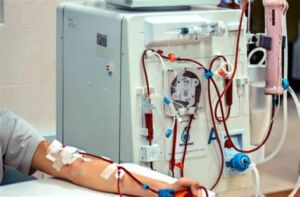Dialysis: The Road Forward and Kidney Care Options
In the world of medical care, there are a few procedures as crucial as kidney dialysis for people dealing with kidney failure. People usually regard kidney dialysis as the umbilical cord that supports the failing natural kidney filters. A recent study estimates that people suffering from kidney disease tend to face monetary losses in a year. However, Many consider kidney dialysis a beacon of hope. Let us proceed further and examine the power of the human spirit, the intricacies of healthcare, and how kidney dialysis affects people’s lives and their relatives.
About Kidney Dialysis
Kidney dialysis becomes the treatment for individuals experiencing kidney failure, a condition in which the kidneys can’t eliminate waste and excess fluids from the bloodstream. This leads to the crucial question: “When do I need dialysis?” Kidney dialysis emulates this essential function of the kidneys when they fail to execute that function. its function resembles sustaining life or keeping the body safe from toxic material. Kidney dialysis acts as a substitute kidney to purify blood and normalize equilibrium. For people with problematic kidney functions, such as in chronic kidney disease or diabetes, this process becomes a lifeline.
The Kidney Disease Scenario
Experts describe kidney disease as broadly impacting health globally. Over 850 million people worldwide suffer from kidney problems, says the World Health Organization. Conditions like CKD and diabetes cause the death of about 2 million people every year.
Chronic kidney disease affects 10% of the world’s population, leading to severe issues. Many in this group develop ESRD, needing treatments like dialysis. Kidney disease highlights the need for awareness, prevention, and healthcare access. Understanding this helps us grasp policy roles in treating kidney ailments.
Kidney dialysis – Types, effectiveness, side effects
When do I need dialysis? This is a crucial question for many facing kidney-related health issues. Kidney dialysis, a life-saving medical procedure, manifests itself in two primary forms: hemodialysis and peritoneal dialysis. The second method that is used a lot is called hemodialysis. It filters blood externally via a dialyzers, removes foreign substances, and then returns the blood to the body. In contrast to peritoneal dialysis, it uses an artificial filter to exchange fluids into the patient’s body and clean the blood.
Hemodialysis: A Statistical Perspective
The most recent statistics show that hemodialysis leads as the type of renal replacement therapy. The National Kidney Foundation reports that approximately 90% of kidney dialysis patients undergo hemodialysis. Usually, this process takes 3-4 hours and requires patients to go through it 3 times a week.
Peritoneal Dialysis: A Unique Alternative
Although much rarer than this, peritoneal dialysis is a suitable option in specific cases. This work gives more leeway since individuals do it in their houses. Presently, around 10% of people in a kidney dialysis program choose peritoneal dialysis for reasons beyond convenience, including lifestyle issues.
When Do I Need Kidney Dialysis? The Right Time of Treatment
Understanding when kidney dialysis becomes the next stage in kidney disease management is important. Such a question as “When do I need dialysis?” is quite common for patients whose kidney function considerably decreases. This decision on whether to start dialysis depends on several factors such as kidney function tests, overall health status, and symptoms like severe fatigue; inability to optimize fluid overload control, or high blood waste levels. Understanding when kidney dialysis becomes the next stage in kidney disease management is important.
How Kidney Dialysis Alters Quality Life
Quality of life affects patient’s lives far beyond the kidney dialysis treatment room due to the physiological and emotional effects caused by kidney dialysis. Persistent fatigue, strict diets, and interrupted daily routines are some of the challenges that many dialysis recipients face. These further physiologic strains are due to imbalances in fluid removal during dialysis sessions that cause blood pressure fluctuation and anemia. These psychosocial consequences might be anxiety and depression that result from a hard life adjustment. It is important to be aware of and address these complex challenges to improve comprehensive nursing care for patients on kidney dialysis.
The Financial Terrain
Kidney care dialysis brings significant financial strain on healthcare and patients. The economic burden is important in the Indian context. The annual cost of one hemodialysis patient can reach from INR 5 lac to INR 7 lac. For the same case, it can reach from INR 6 lac to INR 9 lac. The growing economic pressure underscores the importance of instituting prevention measures and comprehensive health care policy given, the rising cases of kidney disease in India.
Innovation in Kidney Dialysis Technology
Kidney dialysis has always been fluid and not a static place. Advances in technology are bringing change to the patients’ experience. Think of a future that enables wearable devices to track vital signs tailor-made for each person. The use of portable kidney dialysis machines gives autonomy and freedom to patients outside the hospital room. Bioartificial kidneys, which represent an important breakthrough in science, aim at mimicking complicated activity done by a natural kidney that can change therapy results altogether. The improvements in this treatment are not only progress but mean relief for persons who are subjected to dialysis. Embracing the modern revolutionizing technology, the horizon of kidney dialysis unveils new hopes for a patient-centered approach to better health outcomes in the renal community.
Conclusion
This journey into kidney dialysis shows it’s not just treatment, but a second life for many. Dialysis is crucial against kidney diseases, affecting many worldwide annually. However, Kidney dialysis impacts more than numbers. It reaches emotions as well as bank accounts. Hemodialysis and peritoneal dialysis bring high costs, challenging healthcare improvements New technologies like wearable monitors promise easier kidney dialysis soon. Kidney dialysis is a path to renewed strength and resilience. In summary, our goal is to extend life and ensure comfort for kidney patients.


